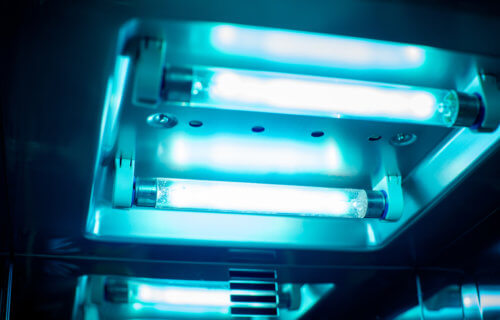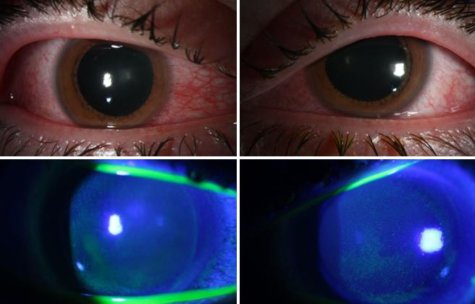
COVID-killing UV lamps may cause serious eye damage, researchers say
November 28, 2020 Coronavirus, Health & Medical by John Anderer
MIAMI, Fla. — One of the most frustrating aspects of the COVID-19 pandemic is the virus’ ability to remain infectious on surfaces for days on end. In an attempt to rid their homes of the coronavirus, many people have started using ultra violet light emitting lamps. While UV light can kill bacteria and viruses, a new study finds those germicidal lamps may represent a serious health risk to your eyes.
Researchers at the Bascom Palmer Eye Institute at the University of Miami Miller School of Medicine report that several of their patients using UV lamps to clean their homes have developed a serious and painful inflammation of the cornea called photokeratitis.

Injected conjunctiva (redness) of the right and left eye (top row)
Diffuse staining of the cornea with green dye indicating epithelial damage (bottom row).
(Credit: Bascom Palmer Eye Institute)
“During the height of the pandemic, we noticed an increased number of patients coming in with irritation, pain and sensitivity to light,” says first author and Bascom Palmer resident Jesse Sengillo, M.D., in a university release. “We realized this was after direct exposure to germicidal lamps that emit UV light in the C range to kill bacteria and viruses. This can be quite a painful experience for the patient, but with prompt topical lubrication and antibiotics to prevent infection, patients often do very well.”
“During the height of the pandemic, we noticed an increased number of patients coming in with irritation, pain and sensitivity to light,” says first author and Bascom Palmer resident Jesse Sengillo, M.D., in a university release. “We realized this was after direct exposure to germicidal lamps that emit UV light in the C range to kill bacteria and viruses. This can be quite a painful experience for the patient, but with prompt topical lubrication and antibiotics to prevent infection, patients often do very well.”
UV light can be an issue in certain environments
Typically, UV-related photokeratitis develops when a patient’s cornea is overexposed to UV light. This can happen at high elevations, due to the atmosphere absorbing fewer UV rays. It is also common near bodies of water, snow, or other reflective surfaces. It usually takes a few hours, but eventually patients start to feel burning in their eyes and increased light sensitivity.
There are quite a few UV light lamps available for purchase nowadays. While these products are technically “safe for in-home use,” researchers stress that consumers need to follow the instructions carefully.
“The patients we met were not aware of these recommendations, and many were unknowingly exposed at work” says co-author and fellow resident Anne Kunkler, M.D., B.S. “For UV-C emitting devices, it is best to leave the room while the device is on. Our patients were directly exposed to the light for various lengths of time. A few hours later, they felt discomfort and sought medical attention.”
If you start feeling discomfort in your eyes after using a UV lamp, study authors recommend seeking medical attention immediately. To be clear, this study didn’t attempt to determine just how effective UV light is at killing SARS-CoV-2.
“Our study was not designed to answer that question. If you choose to use these lamps, just make sure to follow manufacturer recommendations closely to avoid unnecessary injury,” Dr. Sengillo concludes.
The study is published in Ocular Immunology and Inflammation.
No comments:
Post a Comment